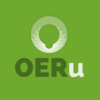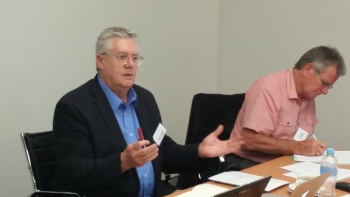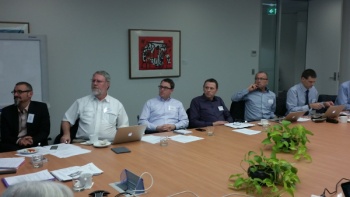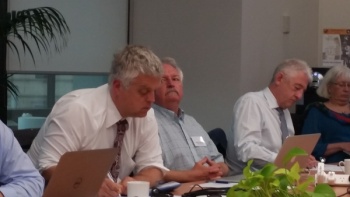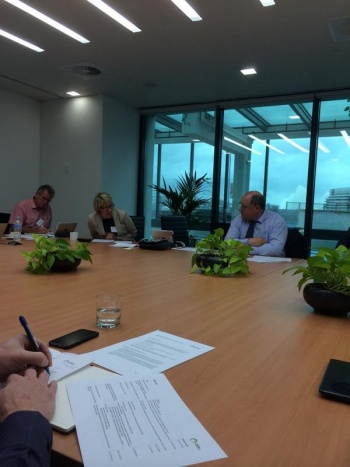Report of the 2nd meeting of the OERu Council of Chief Executive Officers
| OERu 2014 Events | |
|---|---|
| OERu 14.11 OERu Council of CEOs | Homepage | Logistics | Agenda | Confirmed participants | Report |
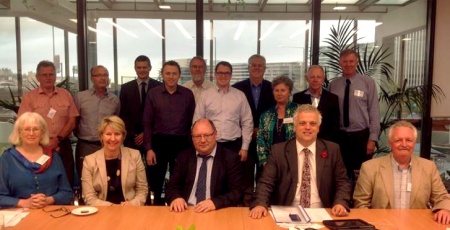
| “ | Intense, productive conversation going on now at the #OERu CEOs meeting in Sydney (Photo link). | ” |
| —Tweet from @tjbliss | ||
Fifteen OERu partners, representing forty-three percent of the partner network convened at the Sydney Business School, University of Wollongong on 10 November 2014 for the 2nd meeting of the OERu Council of Chief Executive Officers. Dr David Porter led proceedings as Chair pro tempore representing Dr Alan Davis of Kwantlen Polytechnic University, the current international Chair of the Council. The meeting reviewed progress of the OERu 2014 operational priorities and endorsed the OERu 2015-2017 Strategic Plan with minor additions. The Council reviewed issues tabled by the OERu partners meeting and also discussed strategies for building the OERu innovation partnership.
|
Contents
- 1 Summary of key decisions
- 2 Welcome and introductions
- 3 Summary of OERu progress
- 4 Review of the terms of reference for the OERu Council of Chief Executive Officers
- 5 Approval of the OERu Strategic Plan 2015 - 2017
- 6 Issues raised by the 3rd meeting of OERu partners
- 7 Matched funding projects
- 8 Conclusion and next meeting
- 9 References
Summary of key decisions
- Agreed to focus the recruitment of new partners from the following regions: Africa, Europe, and United States
- Approved the following additions and revisions to the OERu Strategic Plan 2015 - 2015:
- Accentuate strategic goal to develop product for a coherent programme of study by moving to Goal 1 in the plan
- Increase the KPI for the number of completed courses for 2015
- Insert missing KPI for increase in number of programmes during 2015
- Incorporate KPI to determine recommendations for tracking learners who are accessing OERu materials
- Incorporate KPI to develop guidelines and recommendations for measuring OERu learner satisfaction.
- Endorsed the OERu Strategic Plan 2015 - 2017 (taking revisions into account) for approval by the OER Foundation Board of Directors at their December 2014 meeting.
- Agreed that the Council of CEOs will proactively assist the OER Foundation to identify leads for prospective partners to join the network to achieve 2015 recruitment targets.
- Agreed to publish annual "Institutional Action Plans" in which OERu partners will delineate plans for allocating their 0.2FTE contribution mapped to the KPIs of the strategic plan.
- Agreed to recognise contributions to OERu by staff as authentic institutional activities aligned with agreed partner contributions.
- Recommended the implementation of matched-funding projects between the OER Foundation and OERu partners subject to surplus funds and or funding support from donors.
Welcome and introductions
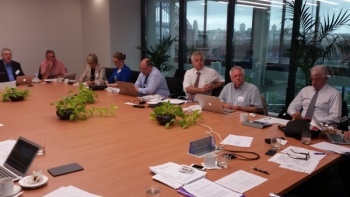
Professor Eeva Leinonen, Deputy Vice-Chancellor (Academic) at the University of Wollongong welcomed participants to the 2nd meeting of the OERu Council of Chief Executive Officers (CEOs) which was hosted in the Boardroom of the Sydney Business School of the University. She underscored the significance of the OERu vision for more affordable education for all. Eeva noted that the University of Wollongong was an early adopter of digital technology as a regional campus and highlighted that the future of education will rely increasingly on active participation in digital networks and international innovation partnerships.
Summary of OERu progress
- Recognising the value of the OERu for professional development in open education methods at partner institutions;
- Acknowledging opportunities for the OERu network to progress international systems for OER quality assurance;
- Affirming that the OERu model fosters a sustainable and constructive way to address issues associated with unbundling of selected services in higher education;
- Acknowledging tensions between institutional business models and serving the public good;
- Noting the negative reaction of many academic staff to commercial MOOCs and how the OERu model provides alternate points to market ("long tail" economics);
- Acknowledging that the demand for access to quality education is huge and that non-participation is not a viable response for publicly funded institutions but noting the challenges associated with capacity and capability to engage;
- Noting that the OERu model provides a "galvanising agent" to support faculty engagement in open education;
- Commending the OERu's philosophical consistency to openness (open governance, open planning and transparency) differentiating the activities of the partnership from "open washing" practices found in the commercial sector;
- Recognising the challenge of integrating open educational practices into the workflow of partner institutions;
Review of the terms of reference for the OERu Council of Chief Executive Officers
Dr David Porter invited the Council to review the terms of reference adopted at the 2013 inaugural meeting of the Council of CEOs. Three refinements were proposed:
- Making clear that the roles and responsibilities refer to OERu activities.
- Developing a more definitive statement about the institutional autonomy of partner institutions.
- Expanding the role regarding the offer of courses and programmes using open education approaches to mention credit and articulation options.
Participants discussed the need for expanding the Executive Committee of the Council, for example, considering the viability of including national representatives from Countries with a high number of OERu partners. The meeting agreed to continue with the existing structure of the Executive Committee comprising the Chair and regional representatives:
- Chair: Dr Alan Davis, President and Vice Chancellor, Kwantlen Polytechnic University, Canada (and North American representative)
- Africa: Prof Martin Oosthuizen, Deputy Vice-Chancellor Teaching and Learning, North-West University, South Africa.
- Europe: Prof Clive Mulholland, Vice-Chancellor, The University of the Highlands and Islands, United Kingdom.
- Oceania: Phil Ker, Chief Executive, Otago Polytechnic, New Zealand.
Approval of the OERu Strategic Plan 2015 - 2017
A summary version of the Draft Strategic Plan![]() was distributed to participants. It was acknowledged that the strategic plan was primarily derived from proposals for action tabled at the 2nd meeting of OERu partners and recommendations from the inaugural meeting of the OERu Council of CEOs in 2013. The draft plan was posted on the wiki in May 2014 for open consultation culminating in the online SCoPE seminar hosted by BCcampus. The revised plan incorporating feedback from the open consultation process was then discussed in detail during the 3rd meeting of OERu partners in Hobart.
was distributed to participants. It was acknowledged that the strategic plan was primarily derived from proposals for action tabled at the 2nd meeting of OERu partners and recommendations from the inaugural meeting of the OERu Council of CEOs in 2013. The draft plan was posted on the wiki in May 2014 for open consultation culminating in the online SCoPE seminar hosted by BCcampus. The revised plan incorporating feedback from the open consultation process was then discussed in detail during the 3rd meeting of OERu partners in Hobart.
Summary of the discussion
Participants underscored the importance of increasing membership from developing countries. The network acknowledged the need to consider how to engage institutions which cannot afford the membership fees, but have skills to contribute to the partnership. While the network will continue to welcome new partners from countries with a high number of existing partners, the participants recommended that the OERu should endeavour to increase membership from Africa, Europe, and the United States. It was noted that while the OERu network includes membership from private not-for-profit institutions, there is no restriction on the membership of private for-profit institutions which are duly accredited in their respective jurisdictions. Members of the Council of CEO's were invited to assist the OER Foundation in identifying leads for prospective partner institutions through their personal networks.Participants stressed the importance for the OERu partnership to develop product for a coherent programme of study and agreed to shift this to Strategic Goal 1 to reflect the high priority of this goal in the plan. The participants recommended that the key performance indicators for completed courses during 2015 should be increased. The meeting also noted that partner institutions are free to nominate full programmes of study for offer using the OERu "assessment-only" model as this would not increase the marginal cost of development for local online courses developed for the full-tuition model. Examples of full programmes nominated by partner institutions to date include: Otago Polytechnic's "Graduate Diploma for Tertiary Education" and North-West University's "Postgraduate Diploma in Disaster Risk Studies".
The meeting discussed the potential of learner analytics and recommended the inclusion of a key performance indicator to determine how the OERu will track the number of learners accessing OERu course materials. Participants also endorsed the inclusion of strategies to determine student satisfaction. It was recommended that the OERu explore alternate credentials and exit points within the programme of study.
Approval of the OERu strategic plan 2015 - 2017
Taking the recommended recalibration of key performance indicators into account, the OERu strategic plan was approved by the OERu Council of CEOs for tabling at the December 2014 meeting of the OER Foundation Board of Directors for final approval and implementation.
Issues raised by the 3rd meeting of OERu partners
The meeting discussed the issues raised by 3rd meeting of OERu anchor partners for consideration by the OERu Council of CEOs.
The Council endorsed the proposal for each OERu partner to submit an annual Institutional Action Plan which aims to coordinate how partner institutions plan to allocate their 0.2FTE contribution in support of achieving the key performance indicators of the OERu strategic plan. The OER Foundation will work with David Gibson from Curtin University, who proposed the concept during the partners meeting, to develop a concise planning template.
The meeting noted with appreciation that a number of partners are contributing significantly more than the agreed 0.2FTE allocation. Participants discussed the difficulties in measuring contributions in kind to the OERu partnership. The meeting encouraged partner institutions to progress OERu activities as part of normal workflow in their organisations. In summary, the CEO's meeting recommended that OERu contributions from OERu partner staff should be recognised as authentic institutional activity aligned with agreed partner contributions. It was acknowledged that OERu partners will benefit from integrating experience gained from OERu engagement for mainstream implementation on campus.
Participants noted the importance for OERu to start working on solutions to allow tracking of learners for learner support and resource improvements. The meeting also acknowledged the value of research on prospective markets the OERu aims to serve so as to align objectives and priorities for the selection of courses, delivery models and future marketing initiatives.
Matched funding projects
Wayne Mackintosh tabled the concept for matched funding projects whereby the OER Foundation would aim to secure grant funding to support selected projects hosted by OERu partners on a dollar for dollar basis. For example, the OER Foundation could match funding for designated staff who would be working on agreed projects. A number of participants reported on the success of this approach from their own experience and noted that this would be a powerful model to progress the implementation of the OERu. The meeting emphasised the need for clearly defined projects and appropriate processes for identifying and selecting recipients for matched funding within the network. The Council of CEOs recommended that the network should proceed with the matched funding model.
Conclusion and next meeting
The 2015 OERu partners meeting will take place on 7 & 8 October 2015, followed by the OERu Council of CEOs meeting on 9 October 2015 to hosted by North-West University in South Africa. The OERu 2015 meetings will precede The 26th ICDE World Conference to be hosted at Sun City from 13 - 16 October 2015. Martin Oosthuizen, representing North-West University, assured participants of traditional South African hospitality and looks forward to welcoming the OERu partners to Africa.
David Porter thanked participants for their constructive contributions to the meeting.
References
- ↑ Left to right: Dr Christine Wihak, Director PLAR, Thompson Rivers University, Open Learning (TRU-OL); Phil Ker, Chief Executive, Otago Polytechnic; Dr Irwin DeVries, Director, Curriculum Development, Thompson Rivers University, Open Learning (TRU-OL); Prof Eeva Leinonen, Deputy Vice-Chancellor (Academic), University of Wollongong; Prof Andrew Vann, Vice-Chancellor and President, Charles Sturt University; Chris Hubbard, Director of Service Industries and Learning Innovation, NMIT; Prof Rory McGreal, UNESCO, COL & ICDE Chair in OER, Athabasca University; Assoc Prof Jonathan Powles, Director Teaching and Learning, University of Canberra; Dr TJ Bliss, Programme Officer, William and Flora Hewlett Foundation; Dr David Porter, Chair pro tem representing Dr Alan Davis, President and Vice-Chancellor at Kwantlen Polytechnic University; Prof Sandra Wills, Pro Vice-Chancellor Student Learning, Charles Sturt University; Prof David Sadler, Deputy Vice-Chancellor (Students and Education), University of Tasmania, Dr Ray Meldrum, Executive Dean Academic Development, Unitec; Prof Martin Oosthuizen, Deputy Vice-Chancellor Teaching and Learning, North-West University; Assoc Prof David Gibson, Director, Learning Engagement, Office of DVC Education, Curtin University; Absent from photo: Paul Binney, Chief Executive, Northtec; Prof Ken Udas, Deputy Vice-Chancellor (Academic Services) and Chief Information Officer, University of Southern Queensland; Dr Wayne Mackintosh, UNESCO, COL & ICDE Chair in OER, OER Foundation.
